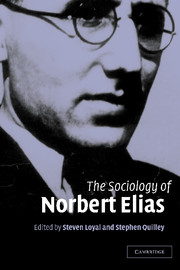Book contents
- Frontmatter
- Contents
- List of contributors
- Acknowledgements
- 1 Towards a ‘central theory’: the scope and relevance of the sociology of Norbert Elias
- Part I Sociology as a human science: Norbert Elias and the sociology of knowledge
- Part II Processes of stratification: figurations of race, class and gender
- Part III The formation of individuals and states
- 9 Not so exceptional? State-formation processes in America
- 10 Armed peace: on the pacifying condition for the ‘cooperative of states’
- 11 Changing regimes of manners and emotions: from disciplining to informalizing
- 12 Elias and modern penal development
- 13 Elias, Freud and Goffman: shame as the master emotion
- Part IV Religion and civilizing processes: Weber and Elias compared
- Index
- References
13 - Elias, Freud and Goffman: shame as the master emotion
Published online by Cambridge University Press: 22 September 2009
- Frontmatter
- Contents
- List of contributors
- Acknowledgements
- 1 Towards a ‘central theory’: the scope and relevance of the sociology of Norbert Elias
- Part I Sociology as a human science: Norbert Elias and the sociology of knowledge
- Part II Processes of stratification: figurations of race, class and gender
- Part III The formation of individuals and states
- 9 Not so exceptional? State-formation processes in America
- 10 Armed peace: on the pacifying condition for the ‘cooperative of states’
- 11 Changing regimes of manners and emotions: from disciplining to informalizing
- 12 Elias and modern penal development
- 13 Elias, Freud and Goffman: shame as the master emotion
- Part IV Religion and civilizing processes: Weber and Elias compared
- Index
- References
Summary
Introduction
There is a surprising similarity between three of the giants of modern social science, Freud, Elias and Goffman. For each of them, their first published work took the extremely unusual step of proposing that shame and embarrassment were crucially important in human affairs. It would not be exaggerating to say that each implied that it was the master emotion, rather than love, anger, fear, anxiety, grief or guilt. Since shame, especially, was little discussed in Western societies at the time that these authors were writing, this focus was very much against the grain.
Surprising also are the immense differences in relation to the topics, methods, writing styles, perspectives and training of the authors. Freud was a medically trained Austrian psychiatrist, and Elias a historical sociologist, born and raised in Germany. Goffman was a Canadian, schooled in ethnography and sociological social psychology. Freud's first published work (Freud 1895) was a study of hysteria based upon his own cases, and one of his mentor, Breuer. The method that Freud applied involved a careful analysis of the words, manner and behaviour of these patients, all of whom were women. Freud's writing style, even in his first book, is clear, evocative and elegant, written in the manner of poetry or a novel, but based upon real, rather than fictional episodes.
Elias's first publication (Elias 1939) involved a history of European culture based on excerpts from etiquette and advice manuals over a period of some 600 years.
- Type
- Chapter
- Information
- The Sociology of Norbert Elias , pp. 229 - 242Publisher: Cambridge University PressPrint publication year: 2004
References
- 13
- Cited by



